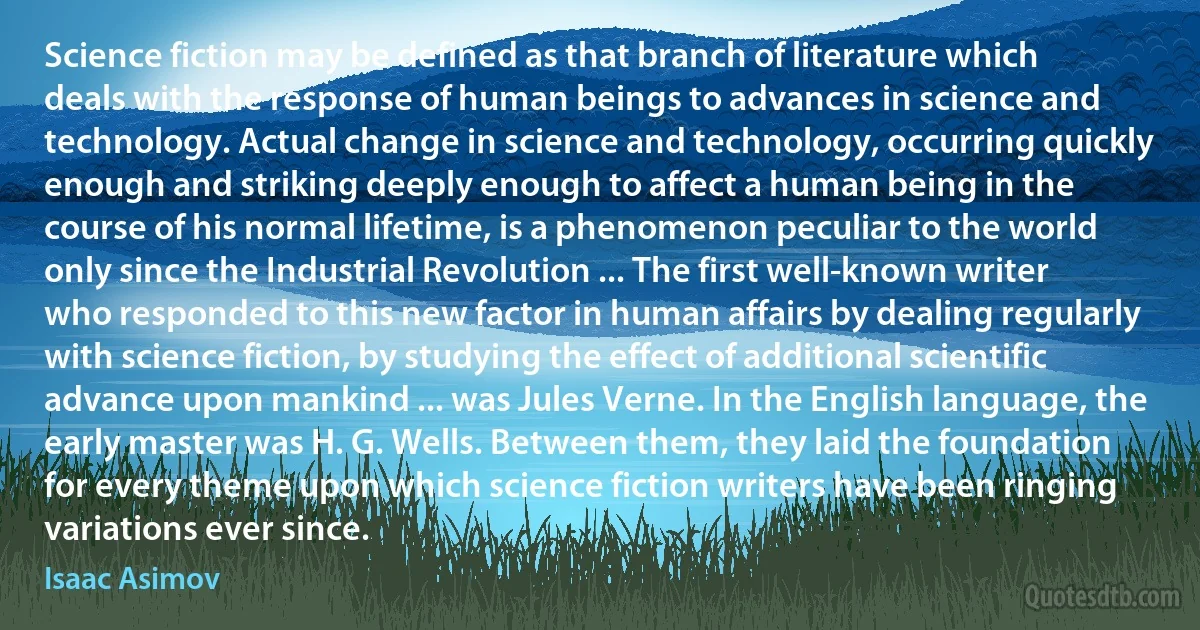
Science fiction may be defined as that branch of literature which deals with the response of human beings to advances in science and technology. Actual change in science and technology, occurring quickly enough and striking deeply enough to affect a human being in the course of his normal lifetime, is a phenomenon peculiar to the world only since the Industrial Revolution ... The first well-known writer who responded to this new factor in human affairs by dealing regularly with science fiction, by studying the effect of additional scientific advance upon mankind ... was Jules Verne. In the English language, the early master was H. G. Wells. Between them, they laid the foundation for every theme upon which science fiction writers have been ringing variations ever since.
Isaac AsimovRelated topics
additional advance branch change course early english enough factor human industrial language lay lifetime master occurring revolution science technology theme world affairsRelated quotes
Moses wasn't the only one who could mangle his language. Fortunately, Moses recognized the call to serve something greater than himself. He answered the call, led his people, and history was made. You, too, will be called at some point. The question, as Mark aptly and artfully laid out, is: Will you be optimistic and hopeful, or pessimistic and cynical? Here are three reasons why you should be optimistic and hopeful. One, you are graduating from a great university. Your SMU degree will open the door to a wide variety of career options. Millions will never have had this opportunity. SMU has laid a foundation so you can reason, and continue to learn throughout your life. It has given you the tools to be productive citizens.

George W. Bush
We of the Labour Party reject policies and measures which failed the nation then and will fail the nation now. We want to lay the foundations of a new and better Britain worthy of our great people. That is why we propose in the interests of the whole nation that the community should become the master of its economic progress and prosperity, instead of leaving control in private hands to be used primarily for the private advantage of a few. In short, we are standing for the common weal. But we need political power to enable us to give practical effect in Parliament to our great forward-looking policies. The nation has now the chance to give Labour the necessary power to do the job, and I appeal to the electors in the constituency which you are contesting to make certain of electing you to the new House of Commons.

Clement Attlee
The movement of modern philosophy is back towards the position of the old Ionian philosophers, but strengthened and clarified by sound scientific ideas. If I publish my criticism on Comte, I should have to re-write it as a summary of philosophical ideas from the earliest times. The thread of philosophical development is not on the lines usually laid down for it. It goes from Democritus and the rest to the Epicureans, and then the Stoics, who tried to reconcile it with popular theological ideas, just as was done by the Christian Fathers. In the Middle Ages it was entirely lost under the theological theories of the time; but reappeared with Spinoza, who, however, muddled it up with a lot of metaphysics which made him almost unintelligible.

Baruch Spinoza
Pity those-adventurers, adolescents, authors of young adult fiction-who make their way in the borderland between worlds. It is at worst an invisible and at best an inhospitable place. Build your literary house on the borderlands, as the English writer Philip Pullman has done, and you may find that your work is recommended by booksellers, as a stopgap between installments of Harry Potter, to children who cannot (one hopes) fully appreciate it, and to adults, disdainful or baffled, who 'don't read fantasy.' Yet all mystery resides there, in the margins, between life and death, childhood and adulthood, Newtonian and quantum, 'serious' and 'genre' literature. And it is from the confrontation with mystery that the truest stories have always drawn their power.

Michael Chabon
There is today almost no scientific theory which was held when, say, the Industrial Revolution began about 1760. Most often today's theories flatly contradict those of 1760; many contradict those of 1900. In cosmology, in quantum mechanics, in genetics, in the social sciences, who now holds the beliefs that seemed firm sixty years ago? Yet the society of scientists has survived these changes without a revolution, and honors the men whose beliefs it no longer shares. No one has recanted abjectly at a trial before his colleagues. The whole structure of science has been changed and no one has been either disgraced or deposed. Through all the changes of science, the society of scientists is flexible and single-minded together, and evolves and rights itself. In the language of science, it is a stable society.

Jacob Bronowski
